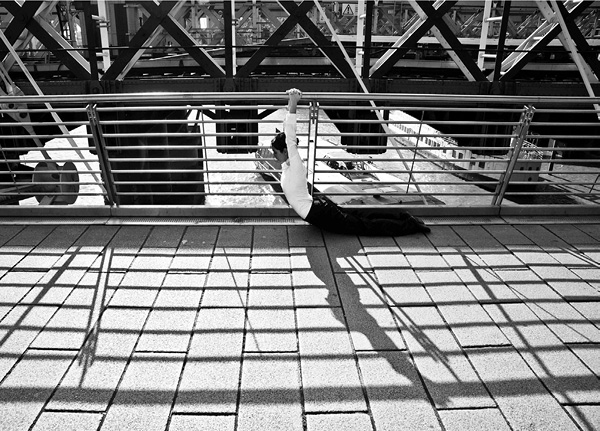
MAKE MY SKIN: INTIMATE REGENERATION OF THE CITY
first performed on March 15, 2016
Six public spaces around the City, London, England
performed six times in 2016
ORIANA HADDAD
David Gibson
075365910i075365910n075365910f075365910o075365910@075365910e075365910m075365910b075365910o075365910d075365910i075365910m075365910e075365910n075365910t075365910a075365910.075365910c075365910o075365910m
embodimenta.com
MAKE MY SKIN: INTIMATE REGENERATION OF THE CITY
ORIANA HADDAD
“The freedom to make and remake our cities and ourselves is, I want to argue, one of the most precious yet most neglected of our human rights.”
—David Harvey, 2008
“Make my Skin” explores the relation between the body and the city. It embraces the art of living the city through a revolution of its physical and sensorial experiences. This art reassesses the primacy of the body to understand and regenerate our everyday urban reality. The city, with its architecture and regulations, is an order of bodily contacts and practices that shape our human nature. By performing urban practices we carry a political order within ourselves. When we passively perform this order as a given reality we censor our freedom and potential of becoming; we neglect our innate agency and urges for regenerating both our self and the environment.
This performance is an Alice-like descent into Londonland; into the architectural, cultural, and political landscape of this machine à habiter—one of the largest of our times. Six different locations around London were chosen for the anthropological significance of their everyday local practices. In each of these locations the body is set “out of place,” as a voluntary and subversive act of alienation from the ordinary; the body is let free to perform alternative pathways and postures, to mimic and reverse the form of the architectural structures and site furnishings. In this way the body generates new information about the environment; it allows new sensations, feelings, and meanings to arise and change consciousness. Such practice explores the power of the body to re-make sense of both the self and city, such that it dismisses any distinction between being a performer and a citizen, a producer and a consumer of reality. The body becomes a sensual and poetic weapon against this political order: it breaks through to the extraordinary, which lies within the ordinary.